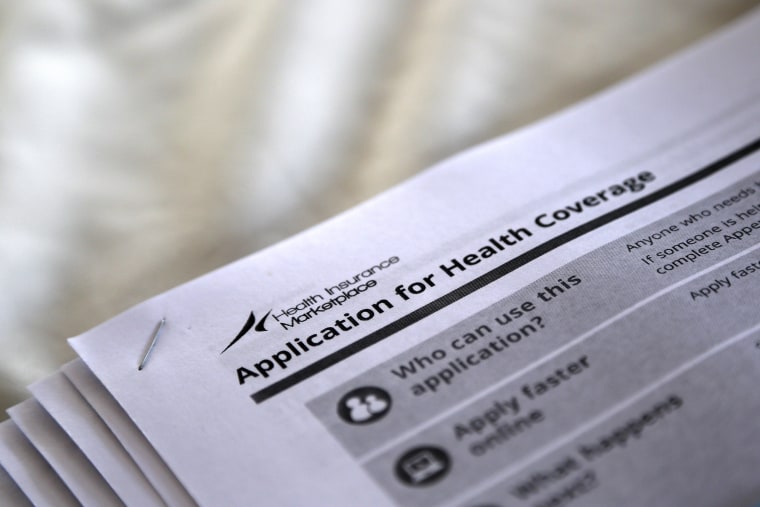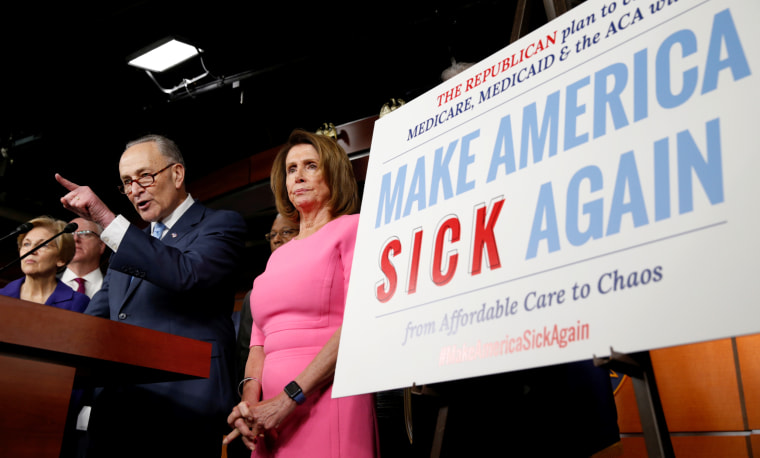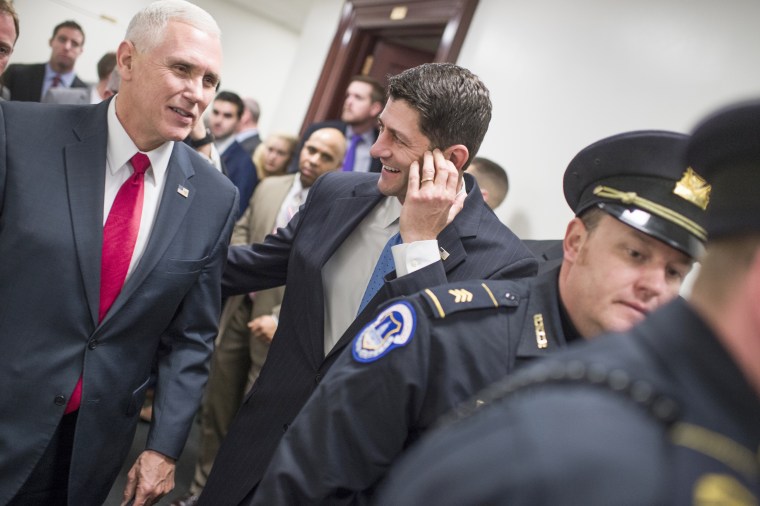Republicans watched President Obama crash against the shores of health care reform over and over again over the last seven years. Now the wheel is in GOP hands, and the politics are only more treacherous.
Republican leaders are excited at the prospect of fulfilling their longtime promise to replace the Affordable Care Act, Obama’s signature legislative accomplishment, and injecting more free market principles into health care. But the path is long, complicated and carries enormous risks, potentially taking the entire insurance system with it in the process.
The main problem is that there is no perfect replacement: Any changes they make to the system will inevitably create new winners and losers, just as Obamacare did. There is a long list of agonizing choices ahead for Republican lawmakers, many of whom are new to the nitty gritty of health care policy.
“There is no way to cover more people, have higher quality, and have it be cheaper,” Aaron Carroll, a health care researcher at Indiana University, said. “If there was, everyone would do it.
Under Obama, Republicans successfully defined themselves in opposition to the new health care system. By keeping their fingerprints off the ACA, which passed in 2010 with no GOP votes at all, Democrats were forced to accept political responsibility for the entire health care industry — the good, the bad and the ugly. Now that dynamic will be reversed and it’s up to Republicans to fix the system.
“They have to do some sort of repeal bill, it’s a political necessity, and once they do that they own it,” Douglas Holtz-Eakin, an economist who has long advised Republicans on health care, told NBC News. “So they need to get it right.”
Lawmakers face a Herculean task of finding a health care plan that can please conservative activists, business groups and voters, and then carrying it to passage, which will very likely require Democratic support.
To Republican small government advocates, the ACA was a body blow for individual liberty that exploded federal spending, raised taxes and put the country closer to a government-run health care system. But many of Trump’s supporters reject that ideology. They simply want better, cheaper health coverage — even if it costs the government more — and expect the president-elect to deliver on his pledges regardless of whatever philosophy is behind it.
These two worlds are set to collide over the next four years. No one is sure what the resulting system will look like, but here's the general road map.
The First Steps
Republicans face two immediate hurdles, one in the immediate term as they look to repeal large chunks of the Affordable Care Act and a more long-term challenge as they work out its replacement. Both of these are related because decisions made on a repeal bill affect their options on the replacement.
The repeal bill is different than most legislation in that it will rely on an obscure parliamentary maneuver called reconciliation that allows the Senate to pass certain budget items with only a bare majority. The upside for Republicans is that they won’t need any Democratic votes; the downside is that there are rules limiting what they can include in the repeal measure.
There’s some consensus in the incoming Trump administration and among congressional leaders that people who gained insurance under through Obamacare’s subsidies should keep it while they work out its replacement. But there’s no agreement yet on how long this period should last. Some experts say it should be as long as four years while conservative House members are pushing for two or less, fearing that anti-Obamacare momentum will fade over time.

Sen. Rand Paul (R-KY), a key vote in the Senate, argues Republicans need to pass a replacement simultaneously and some influential conservative policy experts agree. Sen. Tom Cotton (R-AR) has also expressed misgivings, saying he is worried about “kicking the can down the road.”
The American Medical Association is also calling for the GOP to detail its replacement plan first. Others on the right argue that Senate leaders should challenge parliamentary rules and repeal the entire bill outright in one fell swoop.
Republicans, who only have a 52-seat Senate majority now, will eventually need to work out a bipartisan deal that can get past a Democratic filibuster with 60 votes to achieve a full replacement. The hard deadline for repeal could encourage both sides to finally compromise on a permanent fix — maybe even one that’s not far off from Obamacare in coverage. Or it could arm a ticking nuclear bomb inside the health care system that accidentally destroys it when they find they’re too far apart. And no one knows what the political environment will look like when the time to discuss a replacement arrives.
Keeping Zombie Obamacare Alive
Assuming there’s a delay built in, the next question is how to keep the insurance market functioning before a new system is put in place.
Republicans are eager to repeal the individual mandate, an unpopular tax penalty paid by people who refuse to buy insurance, but doing so could cause chaos in the insurance market.
Under Obamacare, insurers are required to offer plans at the same price to sick and healthy individuals alike, and this section of the law can’t be altered through the congressional budget reconciliation process. But there’s also nothing forcing insurers to sell plans on the exchange. If the mandate disappears and enough healthy people drop their coverage, the resulting losses could cause insurance companies to raise premiums or withdraw from the market.
There are ways to get around this and the insurance industry’s lobby, AHIP, has indicated that they could potentially live without the individual mandate if changes are made elsewhere. But in the short term, the solution may require Republicans to cover insurers’ losses with federal dollars, a move that conservatives have previously decried as a bailout.
Republicans are nervous about taking the blame for a collapse and, led by Trump, have spent the week preemptively arguing Democrats will be at fault if things go awry. They point to problems with the individual market that preceded the election: Premiums jumped 25 percent nationally in the last enrollment period (although the vast majority of those covered were eligible for subsidies to offset the cost) and some major insurers threatened to withdraw because too few healthy customers were signing up for the companies to turn a profit.

“Don't let the Schumer clowns out of this web,” Trump tweeted on Wednesday, referring to the Senate Democratic leader. “Massive increases of ObamaCare will take place this year and Dems are to blame for the mess. It will fall of its own weight - be careful!”
These issues have caused serious concern, but they're still far off from the “death spiral” that getting rid of the individual mandate without a viable alternative could cause. There’s also been a surge of signups for Obamacare since the November election that could potentially keep prices more stable next year.
Regardless of who Republicans blame for any problems, the job of fixing the situation would fall to the Trump administration and the GOP-controlled House and Senate. Democrats are hoping that might give them the leverage they need protect large swaths of the law.
“There will be chaos in the health care system and it will be on their shoulders,” Sen. Dick Durbin (D-IL) told NBC News. “If they want to solve the problem they created they are likely to need bipartisan assistance and I want to come back with something as good or better than the Affordable Care Act.”
Next: The Hard Part
Repeal is difficult, but the tougher part is coming up with a full replacement.
Obamacare has never been broadly supported, but many of its benefits are popular. The percentage of Americans without insurance has plummeted from 17.1 percent in late 2013, when the insurance exchanges launched, to 10.9 percent in 2016, according to Gallup.
As Democrats are quick to point out, repealing the law without a replacement could knock 22 to 30 million people off coverage they’ve obtained through private insurance or Medicaid, according to the Urban Institute. As many as 52 million non-elderly Americans have pre-existing conditions that insurers often used as an excuse to raise premiums or deny selling coverage in the pre-Obamacare world.
Republicans argue that apocalyptic descriptions of full repeal are a straw man argument because whatever they choose as a replacement will improve on the pre-ACA environment when it comes to coverage. Some Obamacare critics also complain that it’s unfair to use a coverage expansion that relies on forcing people to buy insurance as a baseline.
While there’s not a consensus yet, House Speaker Paul Ryan and Trump’s nominee for Health and Human Services Secretary Tom Price have both put forward plans in the past that would offer substantial tax credits to individuals who don’t get insurance through work to help pay for care.
Those subsidies, while structured differently than the ACA’s (they rise with age, rather than income), could grow more generous if Republicans bring Democrats into the room to negotiate a final deal. But any deal that substantially raises spending would enrage conservative activists, some of whom already consider plans that include tax credits “Obamacare-lite.”
“I don’t think there’s a market for reducing subsidies in the aggregate, but the type of subsidies will change,” said Thomas P. Miller, a scholar at the American Enterprise Institute and conservative critic of Obamacare.
The biggest issue is how to pay for it all. The ACA is financed by a mix of cuts to Medicare Advantage providers, taxes on the medical industry and on high-end insurance plans, and taxes on wealthier Americans. These sources bring in enough cash that the law is actually projected to reduce the debt by $350 billion over the next decade, despite large increases in health care spending.
Republicans, who have long complained that the ACA is too expensive, already have some tough decisions coming up in the initial repeal bill. Republican candidates routinely criticized the law’s Medicare cuts in prior elections, but they’re expected to keep them to finance their plan. However, the initial repeal could wipe out the law’s tax provisions, which would dramatically reduce the pool of money available to preserve Obamacare’s coverage gains. Democrats are already preparing to accuse Republicans of cutting taxes for the rich at the expense of health insurance for the poor.
To help balance the budget, Ryan has proposed dramatically reducing Medicaid spending over time and giving states more control over how they use it. Nearly 70 million people currently rely on Medicaid and CHIP programs, a federal/state partnership that covers lower-income Americans, and any cuts could jeopardize their coverage. It could also create political tensions with governors and state lawmakers, some of them Republican, who have used Obamacare’s expanded Medicaid funding to plug holes in their budget.
Some Republican proposals, like Price’s, would cap tax benefits for employer health insurance coverage to raise more revenue, which could cause business owners to seek cheaper and less generous plans for their workers.
Policy experts in both parties have long complained that employer tax benefits are an inefficient way to provide coverage, but any significant changes could spark a backlash, since they’re the dominant means that working individuals and families obtain insurance.
Democrats were mostly careful to avoid touching employer-based health care when crafting the ACA for this reason. One of the most unpopular provisions of Obamacare was its so-called “Cadillac tax,” which targeted only the most expensive employer plans, and Democrats cut a deal with Republicans to delay it last year amid complaints from unions.
Holtz-Eakin predicted few Americans would notice the difference to their plans under the kinds of tweaks proposed by Price, but acknowledged that it would take courage from Republicans to adopt them.
“Politically, people don’t love change,” he said. “The employer market is the one place the Affordable Care Act didn’t change and also the place that’s performed the best since passage.”
Taking Care of Trump’s Base
Most Republican plans would also reduce regulations on what benefits insurers are required to offer in their plans and on how they calculate their prices. With fewer rules, insurers could potentially reduce premiums.
Not everyone would be affected equally, though. The ACA effectively penalized younger customers and subsidized older ones by preventing insurers from charging more than three times as much based on the customer’s age. The Ryan plan would extend this multiple to five. Republicans would also have to decide whether to keep Obamacare’s rules requiring insurers to charge men and women the same amount — before the law, women paid higher premiums in part due to maternity costs.
Some people could also lose insurance over time. While the ACA requires insurers to accept new customers and offer them similar prices regardless of whether or not they have a preexisting condition, Ryan’s plan would only require them to offer similar premiums if they maintained “continuous” coverage.
“That certainly provides some protection, but a lot of people could fall through the cracks,” Larry Levitt, a senior vice president at the Kaiser Family Foundation, told NBC News. “If you need a new roof on your house and can’t pay your insurance premium for a while, you could be locked out.”
That means older Americans with unstable employment and income would stand the most to lose from these changes. Unfortunately for Republicans, that sounds a lot like the blue-collar voters in struggling areas that Trump relied on to win the primaries and general election.
To address this problem, some Republicans have proposed funding high-risk pools that pay insurers to take on sicker patients. Once again, cost is the major obstacle: They only will work if there’s enough money to attract insurers and keep premiums affordable. A proposal from the American Enterprise Institute by conservative experts estimated the starting price tag at $10 billion a year with increases over time to keep up with need. Ryan’s plan budgets “at least $25 billion” over a decade, but details are scarce.
Trump’s Promises
Along this journey, Republicans will also drag behind them the accumulated weight of criticism they have leveled against Obamacare as well as the boasts their politicians (and especially the president-elect) have made about its impending replacement, some of which do not line up.

“Everybody's gotta be covered,” Trump said on "60 Minutes" in September 2015. “This is an un-Republican thing for me to say, because a lot of times they say, 'No, no, the lower 25 percent, they can't afford private.'”
His top aide Kellyanne Conway also drew attention when she said on MSNBC this week that no one who “currently has insurance” will lose it under a GOP replacement. Republicans have been loathe to make that promise, since any plan that cuts spending and removes the mandate is likely to cover fewer people.
Trump also promised not to cut Medicaid, which is a key part of many Republican proposals.
It’s not just Trump, either. For years, the lack of a clear GOP position has allowed politicians to echo their constituents’ complaints about their health care coverage without naming which trade offs they’d tolerate themselves.
"Taken together, the goals that have been articulated by the incoming administration and by many of the repeal advocates are impossible to achieve,” Robert Reischauer, a former director of the Congressional Budget Office, said in a panel discussion last month.
Obama and Democrats paid a major price for falsely promising “If you like your plan, you can keep it,” only to see millions of people lose their plans and have to buy new ones on the exchange in 2013. Now they’re eager to remind voters of Republicans’ promises — progressive Vermont Sen. Bernie Sanders even put Trump’s Medicaid tweets on a poster during a floor speech on Wednesday.
As they transition to crafting real policy, Republicans are trotting out more rhetoric that could come back to bite them. In just the last week, Trump and numerous other lawmakers have assailed Obamacare for high deductibles on its plans.
High deductibles are one of the biggest complaints consumers have about the plans on the exchanges and Republicans are undoubtedly hearing about it from their constituents around the country.
But, as Republicans are about to discover, the leading conservative alternatives don’t actually offer provisions that restrict high deductibles. That’s because out-of-pocket costs are a feature of most policy proposals, not a bug, which encourage customers to use tax-free Health Savings Accounts to pay for individual expenses. The idea is that by pushing customers to have more “skin in the game,” they’ll shop around and drive down costs across the industry.
Stephen Parente, a professor at the University of Minnesota who has run estimates on Ryan’s proposed plan, told NBC News that the most prominent Republican proposals would likely “lead to plans that will have higher deductibles, but are more affordable” thanks to relaxed regulations. This argument has yet to be tested politically, though.
“The ACA was controversial and disruptive, and unwinding it would be at least as controversial and disruptive,” Levitt, of the Kaiser Family Foundation, said. “As previous presidents have discovered, making campaign promises on health care can be popular, but actually slogging through the details is generally quite unpopular.”

